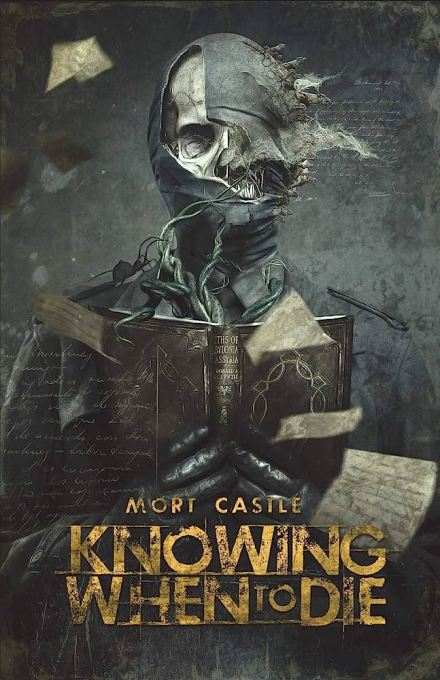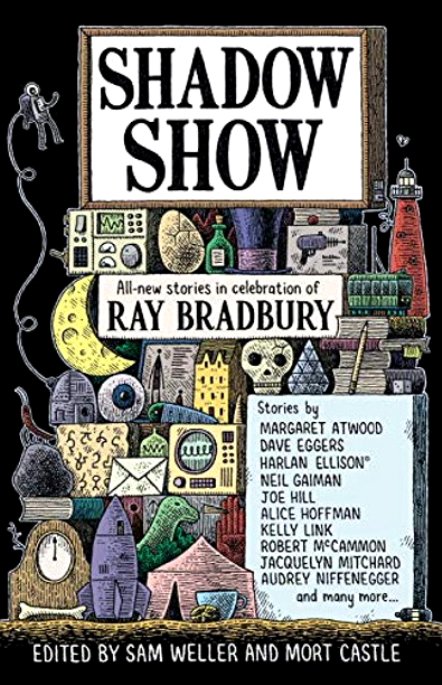
On this month's Special Page:
An interview with three-time Bram Stoker Award-winner Mort Castle...by his grandnephew, Hayden Moore
IN THE "SPECIAL PAGE" ARCHIVES:
Josh Darling
Ellen Datlow
Simon Clark
Trish Wilson
Brent Monahan
.jpg)

Mort Castle and Hayden Moore
About Mort Castle
Harlan Ellison often said, “It’s easy to become a writer but hard to stay a writer.” Mort Castle agrees. His first novel came out in 1967 and, in 2024, 40th anniversary editions of his horror classic The Strangers, lauded in Grady Hendrix’s Paperbacks from Hell, will be published in the USA, Spain, Poland, and other countries, and a TV series based on the work is in development with Mark Harry Valadez (Queen of the South, producer-writer) and Ryan O’Nan (Big Sky, lead actor) attached.
The interview in this issue’s The Horror Zine was conducted by Hayden Moore, Castle’s grand-nephew, who has previously been published in Sports Illustrated. “Hayden is also a promising percussionist,” says the guitar playing Castle, “and has a way with words and music. I won’t be surprised if he keeps on working with both for a long time.”
About Hayden Moore
Hayden Moore lives in Glendale, Arizona, and he is about to be a senior at Sandra Day O’Connor High School. He is a member of the marching band which received 3rd place in the state last year, and they are looking to do even better this year. Future plans include attending Northern Arizona University.
Interview with Mort Castle by Hayden Moore
1) What is the key to success?
First, you have to define success:
This is what I have come to believe about success. This is what I have taught my students.
If you define success as getting published and finding readers who appreciate what you have written, then you can succeed.
The key, then—It takes a little talent and a lot of perseverance.
But if you define success as a book that sells twelve gazillion copies, puts a Lexus in every stall of a 12 car garage, and gets made into a film starring Dave Bautistia, Brad Pitt, and Taylor Swift…You might be the rare one who does succeed, but the odds are against it.
2) When did you realize you had a gift for writing?
Hmm, I'm not sure, but I do distinctly recall making up stories and enjoying that process—and this was before I could write. Indeed, Mrs. Ryan, my kindergarten teacher told my parents, “Someday he’ll be writing for television”—and that was back in the time when very few people had televisions.
That liking for story-making simply stuck with me.
A gift? Yeah, I’ve always had a good vocabulary, always had a need to comment on the world around me, and always enjoyed adding a what if? element to my thoughts.
3) In writing what do you think is more important: patience or determination?
As I see it, patience is determination—and vice-versa.
4) How do you think self-publishing affects overall sales or recognition?
And you find so many mistakes, grammar, spelling, typo in many, many, many self-published books. They are poorly edited—or not edited at all.
And the content, well, many, many, many are just the babble of someone who says, “Anyone can write a book about chicken farming and a cowboy named Lucidia and they get pneumonia but are saved by the UFO from Flagstaff when the sound of a Big Itch comes over the fence.”
And the covers? For some reason, self-pub book covers have improved overall. Most portray people with the proper number of limbs and noses.
Self-published authors typically sell 250 books or less. I know one schlepper who knew nothing and self-published his book in 2008. He promptly sold two copies and that’s been it. One of those sales was to his mother, who shortly thereafter, died.
And so, the marketplace is crowded with dreck. And so, well, take a picture of 10,000 people standing in a field. All but two of them are wearing red clothing. The two “different” ones are dark orange. Now, to get your picture, you have to be way high up in the sky. Everything below looks like…A sea of red.
The rare self-published book that can actually meet pro level standards can on occasion get a decent number of readers. But there’s a ton of luck and much word of mouth involved.
In the meantime, real publishers have cut back on money paid to real authors—because the market is so crowded that it’s hard for a book to stand out and succeed.
5) What do you think causes some authors to have so much more success than others?
If you mean “success” as number of books sold, big money…Here’s a secret. Lots of it is luck.
Ron Hansen wrote a brilliant book called The Assassination of Jesse James by the Coward Robert Ford. The sales were disappointing.
Years went by. Then Brad Pitt read the book. He liked it and guess what?
Isn’t it great that Brad Pitt knew how to read?
6) Were you always drawn to the horror genre, or did you ever want to write something else?
Yes, always drawn to horror.
I’ve told this story often, but thank you, Mrs. Curlin, my third grade teacher at Delano School in Chicago.
She brought in the latest high tech educational media, a long-playing phonograph record, and we eight year olds sat and listened to “Telltale Heart” and “The Pit and the Pendulum,” and were horrified.
Play that today and you’d have 23 school psychologists and a platoon of lawyers on the scene. These traumatized kids will be wetting the bed for decades.
I was enthralled and not traumatized because horror pushed the right buttons in my psyche and soul.
It scares so well!
7) Did you ever have a moment when you wanted to quit? If so what made you keep going?
A moment? Yeah, try yesterday.
Keep going? Well, I sometimes find writing very difficult, very frustrating, a miserable task.
But it always comes back to not writing is even more difficult, more frustrating, and more miserable!
8) What or who was the biggest inspiration to start writing?
The good writing of so many people including Hemingway, Bradbury, James Crumley, Bonnie Jo Campbell, Philip Roth, Flannery O'Connor, Ron Hansen, people who show you, Hey, you can work magic with words.
Writers I admired who told me personally I could do this word magic: Lucien Stryk, J.N. Williamson, Bill Wantling, Ron Hansen.
And family, hey! It's a matter of pride, really inspiring to think Jane can say, “Yeah, Mort, my husband, wrote that.” Or, say, my nephew Hayden could say, “Yeah, my Uncle Mort has a bestseller—in Poland!”
9) When writing, what is your thinking process like? What is your first move?
Initially, just pound out something. Could be half a page, could be a hundred pages, but there’s usually a click point that tells me, Oh, yeah, your story is happening now.
10) Do you have an idea of how your book will do before it’s published or is it kind of just a shot in the dark?
A shot in the dark?
Definitely.
Here’s the metaphor I love:
Bake the best bread you can bake.
Cast it upon the waters.
Sometimes fish eat it.
Sometimes the waves give you back a lot of soggy bread.
But sometimes—miracle—the waves bring it back as fig newtons.


